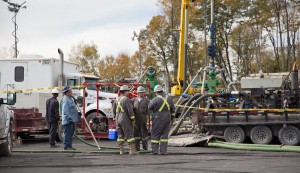EPA Science Advisory Board sharpens criticism of fracking report
From an Article by Jon Hurdle, NPR StateImpact PA, August 11, 2016
EPA science panel calls on the agency to produce more evidence for its assertion that fracking by gas rigs like this one does not have a widespread effect on drinking water.
A scientific advisory panel on Thursday stepped up its criticism of the Environmental Protection Agency’s controversial report on fracking, calling on the agency to provide evidence for its landmark conclusion that fracking for oil and gas has had “no widespread, systemic impacts” on drinking water.
In a finalized assessment of the study, the EPA’s Science Advisory Board said the federal agency should quantify its analysis, which was widely criticized by opponents of the natural gas industry when it was released in June 2015.
The call for data to support the report’s conclusion represented an addition to the SAB’s three previous drafts, which expressed concern about the EPA’s headline conclusion that it had found no evidence of widespread impacts on drinking water but did not call for a quantified analysis.
The 30-member SAB faulted the EPA report for not backing up its main conclusion.
“The SAB finds that the EPA did not support quantitatively its conclusion about lack of evidence for widespread, systemic impacts of hydraulic fracturing on drinking water resources, and did not clearly describe the system(s) of interest (e.g., groundwater, surface water), the scale of impacts (i.e., local or regional), nor the definitions of ‘systemic’ and ‘widespread,’” the report said.
For the first time, the SAB also raised the possibility that the EPA might want to rethink its headline conclusion.
“The SAB concludes that if the EPA retains this conclusion, the EPA should provide quantitative analysis that supports its conclusion that hydraulic fracturing has not led to widespread, systemic impacts on drinking water resources,” the new report said.
It said that 26 SAB members found that the EPA’s statement requires clarification and additional explanation while the remaining four said it was “clear, concise and accurate.”
Critics of the oil and gas industry say there have been many instances of private water sources being contaminated by chemicals used in fracking, damaging the health of people living near drilling rigs.
Dr. David Dzombak, a Carnegie Mellon University engineering professor who chaired the panel that produced the drafts, and who sits on the full SAB, confirmed that the report had not previously called for more data in support of the EPA’s conclusions.
Dzombak also said that the latest report added language raising the possibility that the EPA could scrap its language saying that there was no evidence of widespread impacts to water supplies.
“One option for the agency would be to drop that conclusion,” he told StateImpact. “The SAB is asking here for clarification of an ambiguous statement.”
Some members of the hydraulic fracturing advisory panel that produced the earlier drafts had called on the EPA to drop the controversial language, Dzombak said, and the full SAB is now backing that call.
“Some members had expressed that, and in the review by the chartered SAB, the discussion there brought more emphasis to that, and so it appears in the final report,” Dzombak said.
The EPA said in a statement that it will take the SAB’s report into account when it finalizes the draft in coming months.
“EPA will use the SAB’s final comments and suggestions, along with relevant literature published since the release of the draft assessment, and public comments received by the agency, to revise and finalize the assessment,” the statement said.
Hugh MacMillan, a senior researcher with the environmental group Food & Water Watch, said the new report represents stronger criticism of the EPA’s report than appeared in previous drafts.
“It makes clear that EPA could scrap the language altogether and avoid this issue of having to quantify widespread systemic impacts,” MacMillan said.
He called the new report a “rebuke” of the EPA which he said has “some explaining to do.”
With the new analysis from SAB, the EPA should now explain how it included the “unsupported” assertion about “no widespread impacts” in its draft; who inserted the language, and how late in the game was that decision made, MacMillan said.
“We feel like the agency papered over where the science ended and the policy considerations began,” he said. “It circumvented debate about whether we should really be equating fracking with energy security.”
See also: www.FrackCheckWV.net

